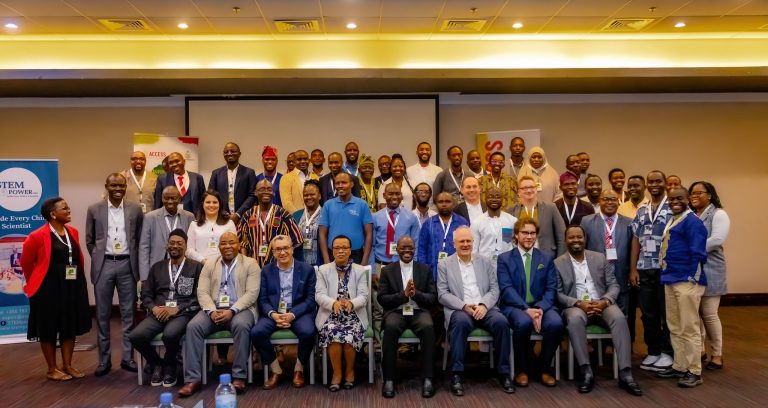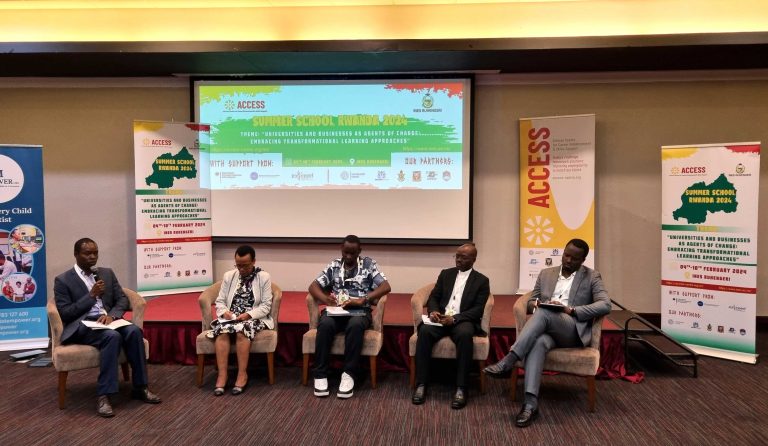ACCESS International Summer School Rwanda 2024
Title: "Universities and Businesses as Agents of Change: Embracing Transformational Learning Approaches"
Date: 04th - 10th February 2024
Venue: Institut d’Enseignement Superieur (INES) in Ruhengeri, Rwanda
Summary
The 5th ACCESS International Summer School was hosted by the Institut d’Enseignement Superieur (INES) in Ruhengeri, Rwanda, and took place from 4 to 10 February 2024. With a focus on “Universities and Businesses as Agents of Change: Embracing Transformational Learning Approaches,” the event covered a wide range of topics concerning the role of universities in preparing students and graduates for the job market while upholding academic standards and meeting industry needs. Speakers emphasised the importance of practical learning methods that bridge theory and practice and the mutual benefits of university-business partnerships.

The Summer School brought together representatives from universities in Germany, Nigeria, Ghana, Rwanda, Tunisia, Kenya, and Benin, as well as the Director General of the Higher Education Council, the Governor of the Northern Province, the Cultural Attaché of the German Embassy in Rwanda, and members from various NGOs such as SPARK, STEM Power, and Feed the Future Hanga Akazi. About 85 participants joined the opening event in Kigali. The Summer School continued at the INES campus in Ruhengeri with further discussion formats, workshops, and field trips.
Keynote speeches and panel discussions highlighted the importance of collaboration between universities, industries, and government to address complex global challenges. Emphasis was placed on transformational learning and the development of employability and entrepreneurship skills. One notable keynote was delivered by Prof. Dr. Robert Kappel, professor emeritus of Economics and Politics in Africa and founder of Leipzig University’s SEPT MBA programme. Prof. Kappel highlighted the pivotal role of innovation in societal progress, stressing Africa’s potential to harness innovation, especially in ICT and digital transformation, for economic growth and improved quality of life. He urged increased investment in R&D and human development to capitalise on this potential, emphasising education and skills development as key components.

Practical sessions, workshops, and presentations were conducted in both Kigali and at the INES Campus in Ruhengeri. A workshop session moderated by Dr. Maroua Chérif (ACCESS Tunisia) and Robertson Klaingar (ACCESS Benin) explored the role of universities and industry in knowledge creation and dissemination through a world café discussion. This session focused on models and mechanisms for university-business linkages, aiming to enhance the skills of academic staff and students while bolstering the employability of university graduates. Participants discussed emerging technologies, successful collaboration models, and the importance of embedding these models into university curricula to provide students with practical, real-world experience.
A follow-up workshop moderated by Bismark Agyei Yeboah, Robert Meyer, and Sandy Adam from the ACCESS Leipzig team focused on refining project proposals for the 2023 University of Ideas competition. Participants worked in teams to enhance their ideas using the project canvas technique. Some 13 innovative proposals were presented, covering topics such as virtual internships, augmented and virtual reality in education, and strengthening alumni networks. The University of Ideas competition aims to promote novel teaching and learning methodologies, enhance university-business linkages, and bolster career enhancement opportunities, ultimately improving the employability of students and graduates in Africa.
Discussions involving academia, industry, and government representatives from Rwanda highlighted the symbiotic relationship between universities and businesses. Strategic partnerships were lauded for their transformative impact on innovation and societal change. However, to fully exploit this potential, it was recognised that academic staff must acquire relevant skills, moving towards dynamic teaching methods that encourage active learning. Addressing the challenge of aligning academia with evolving industry needs, particularly in fields like ICT, emerged as a crucial priority for further exploration and adaptation.
The event also celebrated the 10-year partnership between INES Ruhengeri and Leipzig University, highlighting achievements such as the establishment of the INES Innovation and Incubation Centre (INNOVIC) and successful collaborations under the ACCESS and AGEA projects. Local and international partners were acknowledged for their contributions to skills development initiatives, including universities and organisations that have supported these efforts. Participants also enjoyed tours of historical sites, Kigali City, and Lake Kivu, combining scientific exchanges with cultural and tourism experiences.
The ACCESS International Summer School 2024 in Rwanda was funded by the DAAD (German Academic Exchange Service) under the EXCEED Initiative with financial support from the Federal Ministry of Economic Cooperation and Development (BMZ).
Conference Documents
Media Links
- News report in Africa press
- News report in Newtimes Rwanda
- Start of Summer School Rwanda - news report on ACCESS website
- Summer School Rwanda - review report on ACCESS website
- Summer School report on INES website
- Photo Gallery Summer School Rwanda (flickr)
- Video link Opening day Summer School Rwanda (Youtube)
- Video link Closing day Summer School Rwanda (Youtube)